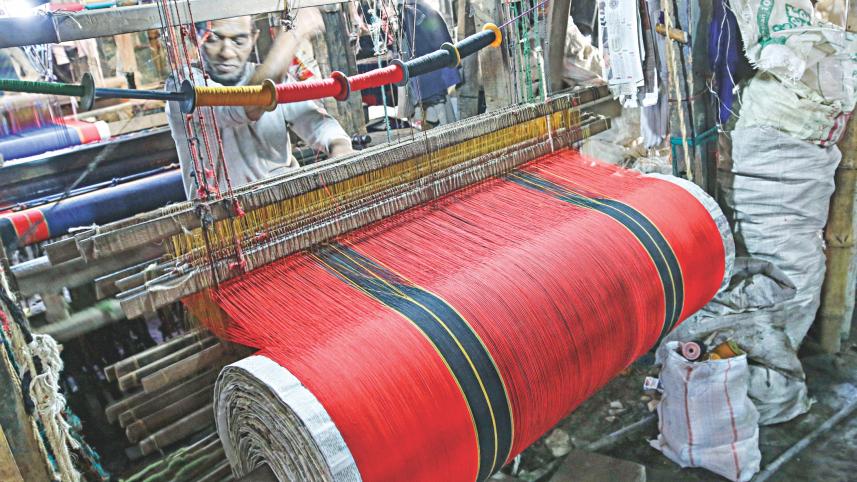Silence of the looms

The fallout from Covid-19 has muffled the sound of looms and the buzz of the clothing markets this year during the peak business season for apparels, Eid-ul-Fitr.
Of the eight to 10 lakh looms in the country, only about two lakh are now in operation, said Md Bodiuzzaman, the joint secretary of the central committee of Bangladesh Handloom and Powerloom Owners Association.
According to the association, the clothing business centres around the two Muslim festivals -- Eid-ul-Fitr and Eid-ul-Azha -- which generate 80 percent of the yearly production of clothes and 60 percent of the annual earnings of loom owners.
"Last year, we earned around Tk 2,000 crore from the clothing business during Eid-ul-Fitr. This year, earning Tk 500 core is becoming impossible in the peak season because the Covid-19 outbreak has put the country into months-long shutdown," said Aiyub Ali Khan, secretary of the association.
Looms across the country manufactures 14 types of attires, including saree and lungi. Over 10 crore lungis and four crore sarees worth Tk 5,000 crore are manufactured a year mostly in Pabna, Sirajganj, Tangail and Narshingdi, according to the association.
Bodiuzzaman, who is also the president of the Sirajganj chapter of the organisation, said only 40,000 to 50,000 out of over three lakh looms in Sirajganj and Pabna are operating this year.
Festival production decreased by at least 80 percent in the last two months because of Covid-19 fallout, he said.
In big factories, 20 to 30 percent looms are running while most marginal weavers have stopped production due to the lack of money, he added.
HARD TIMES FOR WEAVERS
Md Abul Kalam, owner of a powerloom factory in Pabna Sadar upazila's Kulunia village, is operating only four out of his 10 looms.
"I closed my factory on March 25 due to the countrywide shutdown and resumed production on a small scale from the first of Ramadan targeting the Eid market. Of the 10 looms, I am just running four, producing 30 to 35 lungis everyday although I had produced 120 to 150 lungis a day last year around Eid," he said.
Before shutting his factory, Kalam had manufactured over 10 thousand pieces of lungi, most of which remained unsold to date.
Md Jamal Bishwas, a marginal weaver of Kulunia, could not sell any of the over 100 sarees he had weaved before the shutdown.
Jamal had borrowed money and raw materials from local lenders to make those sarees using his two powerlooms.
"Before I could sell my products, all the wholesale markets closed down," he said. He is now stuck with piles of sarees at home and no cash in hand.
"Failing to repay loans, I am unable to resume production," Jamal lamented.
Md Alamin Hossain, trader at Sirajganj's Shahzadpur wholesale clothing market, said the market has been closed since the countrywide shutdown started.
"We do not open our shops. Traders from different areas of the country also cannot come to the wholesale market," he told the Daily Star.
The traders of Baburhaat wholesale clothing market in Narshingdi, however, resumed operation at a small scale from the beginning of Ramadan.
"When the buyers come to the market, they call us and we give them clothes. We are allowed to do business for a few hours every day. Small traders do not pay cash due to their poor business, but we are giving them clothes on credit," Md Mobarak Hossain Ripon, a trader of Baburhaat market, said.
"Last year, I sold 3,500 to 4,000 pieces of lungi earning Tk six lakh to Tk seven lakh a day," he said, adding that this year he is struggling to make Tk five lakh to Tk six lakh in a week.
PRICE HIKE OF RAW MATERIALS
Though the sales declined, prices of threads and dyes have rapidly increased, loom owners said.
Price of one bundle of thread has increased from Tk 16,000 to about Tk 23,000 and the price of one kilogram of dyes has soared from Tk 2,000 to Tk 4,000, they said.
"Thread and dyes are mostly imported from India and China. There has been almost no import in the last two months, so the price of raw materials has increased. Lockdown of Narayanganj, the main market for raw materials of clothing, also pushed up the price," Md Bodiuzzaman said.
INDUSTRY IN NEED OF SUPPORT
"Most of the big loom factories have large bank loans. They are suffering because bank interest is accumulating but they could not sell their products in the last few months to pay interest," he said.
"If they do not get soft loans for resuming their business, nobody will be able to revive their business."
Marginal weavers, running two to three looms, need financial support without any condition, he added.
Although the government announced a Tk 20,000 crore stimulus package for the cottage, micro, small and medium enterprises to deal with the economic fallout caused by the coronavirus pandemic, the weavers and loom owners are still in the dark about it.
Noting that approximately 20 lakh people across the country are involved in the weaving industry, Ayub said they have not received any direction about accessing the benefits under this package.




 For all latest news, follow The Daily Star's Google News channel.
For all latest news, follow The Daily Star's Google News channel.
Comments